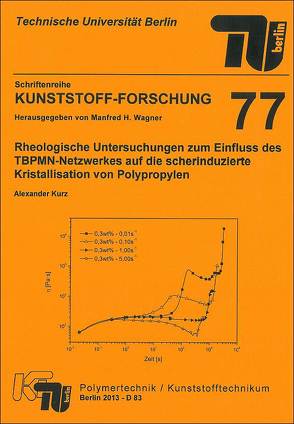
The properties of plastics are strongly influenced by the method of manufacture, processing conditions and microstructure. Hence, polymer crystallization has attracted great scientific and industrial attention during the past 30 years. Isotactic polypropylene (iPP) is a commonly used semi-crystalline thermoplastic with exceptional mechanical properties. Since the α-phase of iPP is the thermodynamically stable crystalline form, it is the most common modification of iPP. Current investigations concerning crystallization kinetics of polypropylene have led to the development of a vast variety of novel nucleating agents. The use of organic nucleators, for example sorbitol derivates, facilitates increased efficiencies of nucleation, because polymer chains epitaxially crystallize at these finely dispersed sugar networks. The present study aimed to investigate the crystallization kinetics and the nucleation efficiency of iPP blended with the novel sorbitol derivate 1,2,3-trideoxy-4,6:5,7-bis-O-[(4-propylphenyl)-methylene]-nonitol (TBPMN). Special emphasis was given to iPP/TBPMN phase behaviour and to the effect of shear deformation on the microstructure formation. A standard isotactic polypropylene with narrow MWD was blended by extrusion with various concentrations of TBPMN. Dynamic DSC analysis of nucleated iPP at quiescent conditions verified a general improvement of crystallinity and nucleation efficiency. Furthermore, reaction of iPP with TBPMN was analysed by dynamic DSC experiments in order to evaluate phase behaviour and miscibility. The thermal stability of TBPMN was evaluated by TGA measurements in oxygen and nitrogen atmosphere. Finally the degradation products of the nucleating agent were characterized by means of FTIR spectroscopy. Crystallization kinetics of iPP under shear treatment were dominated by TBPMN and its network formation during liquid-solid phase separation. Oscillative temperature sweeps within the linear viscoelastic regime allowed a characterization of gelation and temperature hysteresis. An optimum in the nucleation efficiency was reached at small concentrations of TBPMN although larger amounts of sorbitol led to an increase in transition temperatures. Furthermore, phase separation effects and their influence on flow induced crystallization (FIC) were analyzed by linear oscillative shear rheology at different temperature histories related to TBPMN transition temperatures. Prior to TBPMN phase separation from the homogeneous melt, all nucleated systems showed the same linear viscoelastic characteristics as non-modified iPP. But at the starting point of liquid-solid phase separation, a change in the viscoelastic response to thermorheological complexity was detected. In order to investigate the formation of flow orientated iPP crystals, various deformation histories were imposed on the TBPMN network prior to polypropylene crystallization. Step-shear and continuous-shear experiments were performed in order to study the dominating effects on flow induced crystallization kinetics such as shear rate or shear time. Continuous shear histories with constant shear rate resulted in an exponential relation between induction times and shear rate. Based on the determination of Weissenberg numbers (We) for non-modified iPP, a correlation of the transition from point-like nuclei to oriented structures was obtained. In contrast to deformations with constant shear rate, step-shear experiments revealed a power law dependency between TBPMN content and induction times. The power law exponent obtained from the experimental data indicates an epitaxial growth of polypropylene chains on TBPMN fibrilla. WAXD analysis of reflections of the iPP α-crystals showed a strong alignment of the polymer chains due to FIC as well as a shear deformation dependency of crystallographic branching, especially for step-shear histories.
Aktualisiert: 2019-03-28
> findR *
MEHR ANZEIGEN
Bücher zum Thema Flow induced crystallization
Sie suchen ein Buch über Flow induced crystallization? Bei Buch findr finden Sie eine große Auswahl Bücher zum
Thema Flow induced crystallization. Entdecken Sie neue Bücher oder Klassiker für Sie selbst oder zum Verschenken. Buch findr
hat zahlreiche Bücher zum Thema Flow induced crystallization im Sortiment. Nehmen Sie sich Zeit zum Stöbern und finden Sie das
passende Buch für Ihr Lesevergnügen. Stöbern Sie durch unser Angebot und finden Sie aus unserer großen Auswahl das
Buch, das Ihnen zusagt. Bei Buch findr finden Sie Romane, Ratgeber, wissenschaftliche und populärwissenschaftliche
Bücher uvm. Bestellen Sie Ihr Buch zum Thema Flow induced crystallization einfach online und lassen Sie es sich bequem nach
Hause schicken. Wir wünschen Ihnen schöne und entspannte Lesemomente mit Ihrem Buch.
Flow induced crystallization - Große Auswahl Bücher bei Buch findr
Bei uns finden Sie Bücher beliebter Autoren, Neuerscheinungen, Bestseller genauso wie alte Schätze. Bücher zum
Thema Flow induced crystallization, die Ihre Fantasie anregen und Bücher, die Sie weiterbilden und Ihnen wissenschaftliche
Fakten vermitteln. Ganz nach Ihrem Geschmack ist das passende Buch für Sie dabei. Finden Sie eine große Auswahl
Bücher verschiedenster Genres, Verlage, Autoren bei Buchfindr:
Sie haben viele Möglichkeiten bei Buch findr die passenden Bücher für Ihr Lesevergnügen zu entdecken. Nutzen Sie
unsere Suchfunktionen, um zu stöbern und für Sie interessante Bücher in den unterschiedlichen Genres und Kategorien
zu finden. Unter Flow induced crystallization und weitere Themen und Kategorien finden Sie schnell und einfach eine Auflistung
thematisch passender Bücher. Probieren Sie es aus, legen Sie jetzt los! Ihrem Lesevergnügen steht nichts im Wege.
Nutzen Sie die Vorteile Ihre Bücher online zu kaufen und bekommen Sie die bestellten Bücher schnell und bequem
zugestellt. Nehmen Sie sich die Zeit, online die Bücher Ihrer Wahl anzulesen, Buchempfehlungen und Rezensionen zu
studieren, Informationen zu Autoren zu lesen. Viel Spaß beim Lesen wünscht Ihnen das Team von Buchfindr.
